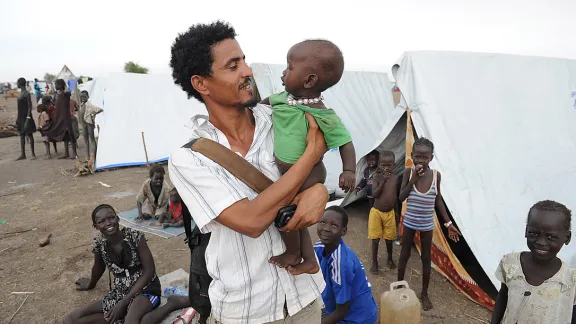
Alemayehu at Leitchuor refugee camp in western Ethiopia. Photo: Christof Krackhardt/Bread for the World
Meet one of the 2500 Humanitarian Heroes at the forefront of the LWF’s emergency response. On World Humanitarian Day (19 August) we pay special tribute to their commitment to assist - often at great personal risk - those facing violence, displacement, hunger, and lack of basic human rights.
Why did you become a humanitarian worker?
Throughout my career, I've been interested in helping people who are at a risk and in need of assistance. Thus humanitarian work is both my passion and my livelihood: I am lucky to be able to support myself by doing what I love –helping others.
When I was younger, I enjoyed helping mom with household repairs. As I grew older, that habit grew and I wanted to help others as well.
I like helping people find solutions to meet their specific needs.
This is not the only reason why I started working in the humanitarian sector; I believe that in this line of work, my qualifications can make a difference in human life.
I think that my education and work background has provided me with the skills and experience that are essential for a professional whose job is not just about applying formulas and using software programs efficiently, but also about designing and planning technologies for the progress of humanity.
Tell us a little bit about the work you do.
As a water engineer I am responsible for the planning and implementation of all WASH [water, sanitation and hygiene] activities, to the delivery of these services to all refugees at the camp.
I participate in design, construction and in-placing of basic WASH infrastructures such as water supply system, latrines and hand-washing facilities.
I monitor that all WASH facilities provided are technically sound, owned by the community and continue to deliver throughout their design period.
In addition, I work towards ensuring optimum community involvement in the conceptualization, development, management, monitoring and evaluation of WASH projects.
What's the most rewarding part of your work?
One of the most rewarding aspects of my work is being part of humanitarian projects that quickly and efficiently provide assistance to people in need.
My personal foremost success as a WASH officer has been the completion of a permanent water supply system in Bambasi refugee camp in 2012.
In a very short period of time, our team of just two technical persons designed and constructed a massive water system with a capacity of supplying potable water to 40,000 refugees, reducing the incidences of waterborne disease in the refugee camp.
Similar rewarding work experiences have followed: in 2013 I designed, supervised and completed the construction of a small-scale water supply system for 2,500 people in six months, and in Bambasi refugee camp I also participated in the planning and implementation of all basic WASH activities, which drastically reduced WASH-related diseases in the camp.
What are some of the more challenging aspects of your work?
The most common challenges I deal with in my work are financial constraints.
It is frustrating to plan a sustainable project, which could make a change in the lives of many people, but which cannot be implemented due to budget shortage.
In humanitarian assistance, the challenges facing refugee camp settings are often gargantuan. I think most people in this sector have become at times overwhelmed by the human suffering and the urgency of life-saving response in escalating humanitarian crises.
What is the most memorable moment you’ve experienced during your work?
The sheer scale of the current humanitarian crisis in South Sudan and the consequent refugee situation in Ethiopia has been an overwhelming experience.
The most gut-wrenching moment in my working life was when I was working in Gambella refugee camp reception center earlier this year. I saw a mother who had just arrived at the center; she was visibly famished, traumatized and exhausted after the long journey she had undergone without food.
Weakened by the ordeals of fleeing to safety, she was not even able to cry or to care for her three-month old baby, whose face was covered by flies. She had nothing to feed or dress her child with.
The balancing act between professionalism and compassion is a constant companion in this line of work.
What does Humanitarianism mean to you?
Philanthropy.
#WHD2014 #HumanitarianHeroes



